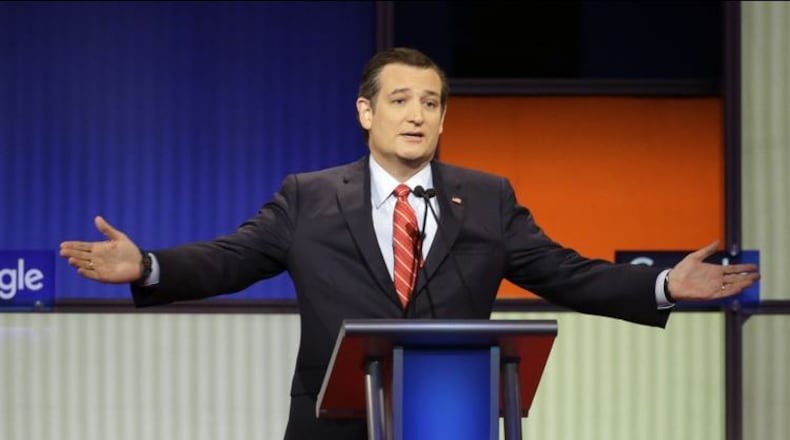Jeb sounding a bit firmer. Ted sounding a bit shakier. Rand sounding a lot Paul-ier.
My, what might have been if every night of this GOP primary had been like Thursday night's debate: Trump-less.
Donald Trump's decision to boycott the debate left "an elephant not in the room," as his bete noire, Megyn Kelly, put it at the beginning of the event. But quickly, the missing elephant wasn't so large. Before long, it was hardly even missed.
Take away the single biggest fact of this election -- that one showman has used it for his own self-aggrandizement, to the confusion, harm and apparent hypnosis of many -- and it looks a lot different. We saw a glimpse of that parallel universe Thursday night. The fortunate thing is that it's not too late for that alternate reality to gradually become actual reality as voters (finally!) begin casting ballots.
The candidate who has suffered the most from Trump's presence during the rest of the campaign, to judge by his absence during the debate, is Rand Paul. The senator who was expected to build on his father's legacy by continuing to champion the libertarian wing of the GOP has, instead, found himself mired in a primary with candidates trying to follow Trump's lead toward the hard lines. During Thursday's debate, Paul was freer to draw contrasts with the rest of the field on issues such as defense spending and the war on drugs. Liberated from the need to go after Trump, Paul roamed from hitting Ted Cruz on amnesty to Marco Rubio on NSA data collection. To be fair, Paul has done some of this even with Trump on stage. But he came across as much surer of himself Thursday, much abler at promoting his natural niche within the party and perhaps broadening his constituency. There is still a chance he surprises us on the upside in Iowa next week, but I have to think Trump's prolonged dominance of the primary has cost him the chance to do much more than that.
Next among the candidates who showed a renewed fight in them absent Trump was Jeb Bush. It's true, as he lamented at one point, that Bush has been the most consistent about taking on Trump during these debates, even though he just doesn't have the personality to go toe-to-toe with Trump. Bush on Thursday looked like a kid who knew the bully wasn't at school that day, and who therefore didn't have to keep looking over his shoulder for the "kick me" sign taped to his back.
For a candidate who has gained the most from Trump, and seemed to suffer from his absence, I would point to Cruz. Cruz has been drafting behind Trump for months, benefiting from contrasts or similarities between them as it suited him. He hasn't quite made the right maneuvers to pass the leader, but it's still to his advantage to have Trump right there ahead of or beside him. That wasn't the case Thursday. Cruz wasn't as free to pick his spots, and he had to assume the role of the race's leader without having actually earned it. His performance was spotty. He looked petty and whiny complaining about his treatment by the moderators, who were hardly unfair to him. He, like Rubio, made his best defense of himself when the moderators played old clips of him singing a different tune on immigration less than three years ago, but on the whole those exchanges were a net loss for him. (By the way, those old clips were a great addition to the debate, and I hereby call for the next debate to feature nothing but Trump responding to old clips of him speaking the Democrats' party line.) He tried to liken his call for "carpet bombing" ISIS territory to the way the first Gulf War was prosecuted, which is simply inaccurate. He did, however, make a brave stand against Iowans' beloved federal corn ethanol mandate.
Rubio wound up at the top of the debate grades, which is right where he's been in the debates that included Trump. He's the most talented all-around candidate in the race, and that's the same whether Trump is in or out of it.
Those who have been also-rans in the past -- Ben Carson, Chris Christie, John Kasich -- mostly remained also-rans. I have a feeling Carson would have faded even sooner, and might not have peaked as high, had Trump not been in the race to stoke the anti-establishment flames.
As far as whether the debate will have any effect on the voting, it's tempting to say no, since Trump didn't actually drop out. That said, caucus-goers in 2012 broke very late for Rick Santorum -- almost one-fifth of his supporters made up their minds the day of the caucus -- so there's a chance. While my impression is that Cruz's ground game is too strong to suffer much, it may be that some of his more libertarian-leaning supporters peel away to Paul after he sounded more like his old self. If there is a big move to be made late, it could be in Paul's favor and at Cruz's expense. But that's a lot of "may" and "if" and "could."
About the Author
The Latest
Featured



